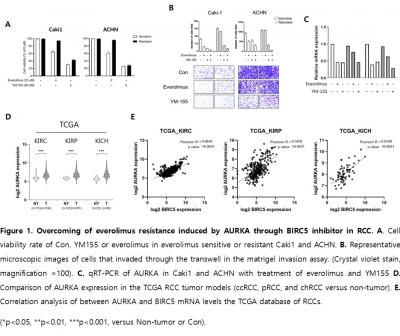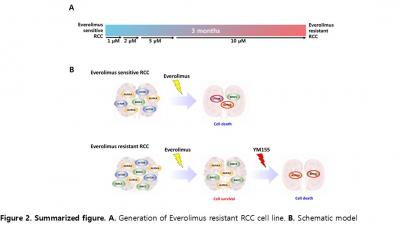|
Basic Research - Cancer(구연)
|
(E-011)
|
|
|
BIRC5 저해제를 이용한 신세포암의 Everolimus 저항성 극복방법 제시 |
| ¹한양대학교 의과대학 비뇨의학과 ²한양대학교 의생명공학전문대학원 임상의과학과 |
| 홍성휘¹, 장은비¹², 황현지¹², 이지영¹, 박성열¹, 문홍상¹, 윤영은¹ |
Everolimus is an inhibitor of mTOR pathway and is one of the option for metastatic ccRCC treatment. However, because drug resistance limits the therapeutic effect, new strategy has been needed to overcome everolimus resistance. Based on our previous study verified that YM155, which is a BIRC5 inhibitor, attenuates RCC, we evaluated the effect of YM155 against everolimus resistant RCC (erRCC).
In order to produce erRCC cells, we treated the everolimus gradually from 1 to 10 µM for 3 months. To find the key factor that causes everolimus resistance but is inhibited by YM155, we sorted the candidates based on a number of accumulated reports and confirmed the mRNA level of candidates using qPCR. To evaluate the efficacy of the classified key factor, we performed the gain of function studies.
All five erRCC cells (Caki1, Caki2, 786-O, A498, ACHN) showed anti-tumorigenic effects by YM155. We screened for genes that induce everolimus resistance, and we selected AURKA, a kinase that is very important for cell cycle regulation. In the TCGA database of RCCs, expressions of AURKA were upregulated in tumors compared to non-tumors, and we found same trend in erRCC compared to plain RCC cell lines. In the erRCC cell, mRNA level of AURKA was not changed by everolimus, but decreased by YM155.
In this study, we generated erRCC cells and verified that AURKA is a key factor causing everolimus resistance. Also, we suggested YM155 as a novel drug to overcome everolimus resistance. This study will shed light on the therapy of various cancers that have everolimus resistance as well as RCCs. |
  |
|
keywords : RCC, Everolimus resistance, YM155 |
|

